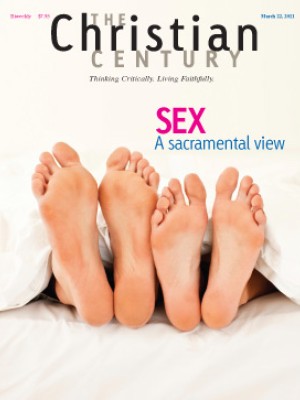Gay cause leads in PCUSA voting
More than halfway through the balloting by regional presbyteries, a proposal to permit ordination of openly gay and lesbian pastors in the nation's largest Presbyterian denomination holds a lead.
The General Assembly of the Presbyterian Church (U.S.A.) last year approved dropping the ban on gay clergy by a 373–323 vote, but ratification by a majority of PCUSA's regional units, or presbyteries, is required to make the change. Three similar attempts to adopt the proposal have failed in the last 14 years.
As of March 4, the unofficial tally was 57 yes, 43 no and one tie. The proposed amendment would need a total of 87 yes votes from the 173 presbyteries for approval. At present, candidates for ministry are barred if they cannot vow chastity in singleness and fidelity in heterosexual marriage.
Read our latest issue or browse back issues.
Advocates for lifting that bar to ordination were cheered in February by the number of presbyteries switching sides. Twelve presbyteries that were opposed to gay candidates in 2009 voted in favor this time, whereas only one presbytery switched from yes to no in the same period.
"So far, the majority of Presbyterians are voting to return to the tradition of rooting ordination in a person's call from God and their gifts to engage in ministry," said Janet Edwards, co-moderator of the advocacy group More Light Presbyterians.
Pam Byers, executive director of Covenant Network, a group favoring passage of the proposal, cautioned against celebrating victory prematurely. She noted that of the first 46 presbyteries voting yes, three decided by a one-vote margin and one by a margin of two votes. One presbytery came to a tie vote, which counts as a no vote.
Presbyterians on both sides of the issue have despaired over the seemingly unending debates on the issue at the national and local levels of the Louisville, Kentucky–based denomination.
While some conservative "renewal" groups have worked to maintain what they describe as biblically based Christian standards, some congregations and church members have left the PCUSA to link up with the conservative Presbyterian Church in America, the Evangelical Presbyterian Church or independent congregations.
In recent months, members of a new group, tentatively named the Fellowship and led by pastors opposed to gay clergy and to liberal social and theological views, have talked about enlisting "like-minded" Presbyterians to leave behind the "rancorous, draining internal disputes that paralyze our common life and ministry" and form a fellowship focused on missions reflecting "classic biblical, Reformed/evangelical traditions."
A stir was caused by the group's February 2 statement, written by a seven-man steering committee and affirmed initially by three dozen other ministers, including pastors of nine of the denomination's 15 largest congregations.
Describing the PCUSA as "deathly ill" and unlikely to survive on its present course, the Fellowship laid out four alternative visions of independence—from a loose affiliation within the denomination to a new Reformed entity.
"We hate the appearance of schism, but the PCUSA is divided already," said organizers of the Fellowship. A meeting set for August 25–27 in Minneapolis would try "to find a new path forward," according to John Crosby, senior pastor of Christ Presbyterian Church, Edina, Minnesota.
"A growing number of orthodox/evangelical/centrist folks have become disenchanted with the divisive tone at the national level," Crosby said. Though "we are committed to what we see as a biblical view of sexuality," he said, "the issues of interpretation and authority extend to the uniqueness of Christian claims of salvation, the deity of Christ and bodily resurrection."
Crosby said in an e-mail interview that if a new Reformed church body were formed, "we think the PCUSA will resolve property issues, hopefully in a gracious manner that several parts of the country have already experienced."
Jack Haberer, editor of Presbyterian Outlook, said it was unclear whether the Fellowship could become the vehicle for a breakaway church body. Haberer recalled a period in 2004 when a number of conservative pastors decided not to be part of a separation movement, despite "enormous pressure" from congregants to bolt from the denomination. Fellowship leaders "are seriously looking at alternative ways to stay in the PCUSA," he said.
One idea is to create something akin to Catholic orders such as the Jesuits that focus on their mission while under the authority of the larger church, according to Pastor Jim Singleton of First Presbyterian Church of Colorado Springs, Colorado. "Most of us simply don't want to exit; we just want to be a different subset within the whole," he said. "A lot of us want to be connected to our historic roots."
Crosby and Singleton have been the principal planners for the Fellowship. The other steering committee members are pastors in Atlanta, Orlando and Houston as well as Newport Beach, California, and Gig Harbor, Washington.
Would the Fellowship be seen as a haven if the gay clergy proposal passes this year? "I don't know that everybody who is opposed to ordination of homosexuals is naturally going to be interested in what we are suggesting," Singleton said. "If fact, we got criticized early on by some of our evangelical brothers because we said in our statement that we're not going to fight the gay issue anymore."
The Fellowship leaders say they remain in touch with denominational leaders on the stresses on the PCUSA's synod and presbytery structures.
Three top Presbyterian officials issued a statement on February 4 that said "this is indeed a rich time of ferment and deep discernment" in mainline denominations. Momentum toward new strategies could "inspire the transformation of congregations and the creation of new worshiping communities in the Presbyterian Church (U.S.A.)," according to the statement by Moderator Cynthia Bolbach, Stated Clerk Gradye Parsons and Mission Council Executive Director Linda Valentine.
This article has been updated since the print edition went to press.






